 Petzlover
Petzlover Bully Kutta is originated from India but Hellenic Hound is originated from Greece. Bully Kutta may grow 34 cm / 14 inches higher than Hellenic Hound. Bully Kutta may weigh 70 kg / 155 pounds more than Hellenic Hound. Both Bully Kutta and Hellenic Hound has same life span. Both Bully Kutta and Hellenic Hound has almost same litter size. Both Bully Kutta and Hellenic Hound requires Low Maintenance.
Bully Kutta is originated from India but Hellenic Hound is originated from Greece. Bully Kutta may grow 34 cm / 14 inches higher than Hellenic Hound. Bully Kutta may weigh 70 kg / 155 pounds more than Hellenic Hound. Both Bully Kutta and Hellenic Hound has same life span. Both Bully Kutta and Hellenic Hound has almost same litter size. Both Bully Kutta and Hellenic Hound requires Low Maintenance.
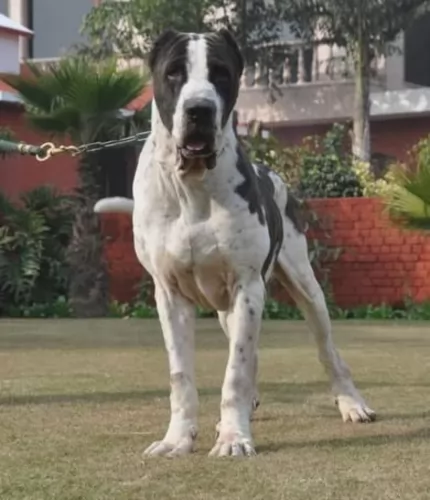 This well built, powerful dog breed is also known as Indian Alangu Mastiff or Pakistani Mastiff. These dogs come from the Punjab and Sindh region of the Indian subcontinent. It is believed that mastiff dogs came with British soldiers during the British invasion, however English Mastiffs, Bulldogs, Bull Terriers and Great Danes are seen as potential ancestors of this large dog.
This well built, powerful dog breed is also known as Indian Alangu Mastiff or Pakistani Mastiff. These dogs come from the Punjab and Sindh region of the Indian subcontinent. It is believed that mastiff dogs came with British soldiers during the British invasion, however English Mastiffs, Bulldogs, Bull Terriers and Great Danes are seen as potential ancestors of this large dog.
There are disputes about the country of origin of this breed, and some people claim that the dog comes from India, while others say it comes from Pakistan. Certainly in Pakistan these dogs are still used for fighting.
 Developed in Southern Greece, the Hellenic Hound was bred to hunt hare and is an ancient breed. It is a medium sized breed with strong scent and tracking skills. It is believed to have been in existence for thousands of years. The ancestry of the breed included the Lagonikoi or laconikoi, native to southern Greece in ancient times. The breed was spread by sailors on Greece trading ships and colonization.
Developed in Southern Greece, the Hellenic Hound was bred to hunt hare and is an ancient breed. It is a medium sized breed with strong scent and tracking skills. It is believed to have been in existence for thousands of years. The ancestry of the breed included the Lagonikoi or laconikoi, native to southern Greece in ancient times. The breed was spread by sailors on Greece trading ships and colonization.
Todays Hellenic Hound is found throughout Europe. Kept somewhat isolated by the mountains, the breed was protected from outside breeding and they remained pure for centuries. It is a fearless, smart and hyped up purebred. The Hellenic Hound needs to have a job and if you don’t give him one, he will find one. He is smart and independent which sometimes makes him stubborn. It also takes this dog longer to mature than others, sometime between two and three years. It is not good for first time owners. Today’s hound is still a popular hunting dog and companion animal as well. They are rarely seen outside of the Greek country.
In 1996 the Hellenic Hound was recognized as the first Greek dog breed into the FCI. They are not recognized by the AKC. Its numbers continue to decline.
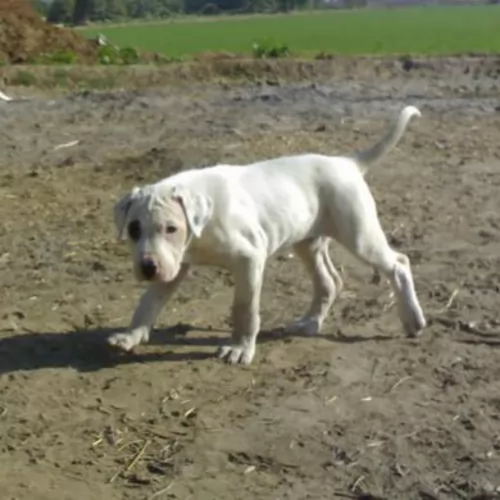 The Bully Kutta is a big, heavy, muscular dog, standing at roughly 81 – 89cm and weighing in at 70–90kg. He isn’t particularly good with children or with other pets simply because the dog is aggressive by nature. If you do opt for this large breed, you’re going to need a large garden and he is going to require a lot of exercise.
The Bully Kutta is a big, heavy, muscular dog, standing at roughly 81 – 89cm and weighing in at 70–90kg. He isn’t particularly good with children or with other pets simply because the dog is aggressive by nature. If you do opt for this large breed, you’re going to need a large garden and he is going to require a lot of exercise.
This is a dog breed that is going to require socialization and training if you want him to be obedient and calm, as he is inclined to be a dominating breed. He’s an intelligent dog and when well trained, he makes a splendid pet with firm, fair owners.
The Bully Kutta has a large, broad head which is supported by a thick well-muscled neck. The skin around his lower jaw is loose. The ears are short, set high and are mostly cropped, but other times they are left to flop over. The tail is sometimes docked but these days mostly left long and tapered.
He has a short smooth coat and is essentially white in color although the coat can also be fawn, brown, black or brindle.
 Today’s Hellenic Hound is not a big dog but rather very average or medium. It is an athletic dog and looks like it. It has a balanced body with a deep chest and thick neck. It has medium height legs that are strong and muscular with paws that are prepared for the terrain it always works on. Its coat is short and tight. The colors of the Hellenic Hound are black with tan or white on the chest. Their heads are noble and rounded with a rectangle shaped muzzle. They have v shaped, long ears and round eyes. Their toe nails are black and so is their nose. It has excellent scent glands, very quick responses, speed and stamina. Their tail is thick and tapers off.
Today’s Hellenic Hound is not a big dog but rather very average or medium. It is an athletic dog and looks like it. It has a balanced body with a deep chest and thick neck. It has medium height legs that are strong and muscular with paws that are prepared for the terrain it always works on. Its coat is short and tight. The colors of the Hellenic Hound are black with tan or white on the chest. Their heads are noble and rounded with a rectangle shaped muzzle. They have v shaped, long ears and round eyes. Their toe nails are black and so is their nose. It has excellent scent glands, very quick responses, speed and stamina. Their tail is thick and tapers off.
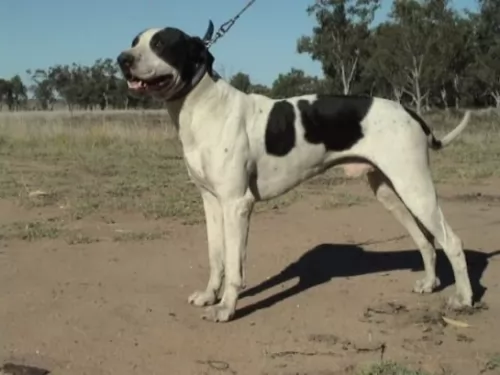 The Bully Kutta is a powerful, imposing dog and they have been nicknamed the ‘Beast from the East’. Unfortunately it is this dog’s thick bones, his looks and his strength that have him used for cruel dog fighting in Pakistan.
The Bully Kutta is a powerful, imposing dog and they have been nicknamed the ‘Beast from the East’. Unfortunately it is this dog’s thick bones, his looks and his strength that have him used for cruel dog fighting in Pakistan.
When not used for fighting, he makes a loyal, devoted companion for the owner who ensures proper socialization and training. Well raised Bully Kuttas are then good with children, being loving, protective and playful.
One just hopes that the future of this giant dog breed is brighter, and that he will be looked upon as more of a companion that just a dog-fighting object to bring in money for his owner.
 yes, they are very fond of children as long as they are carefully socialized.
yes, they are very fond of children as long as they are carefully socialized.
Great hunter, stamina ,scent, voice
He needs to have a yard or land. He doesn’t do well in apartments.
The breed is very intelligent and can be very trainable. However, they can also be stubborn and that makes training harder.
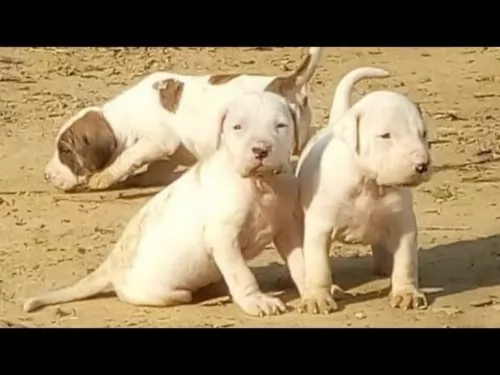 Your Bully Kutta is generally a healthy dog and not often affected by hereditary diseases, but with giant breeds such as this you will have to look out for diseases common to large dogs.
Your Bully Kutta is generally a healthy dog and not often affected by hereditary diseases, but with giant breeds such as this you will have to look out for diseases common to large dogs.
Typical illnesses to watch out for will include hip dysplasia, arthritis, skin allergies and bloat.
This is an inherited condition where the hip joint is improperly formed. For your Bully Kutta it causes wear and tear as well as stiffness in the hips and your dog battles to rise after lying down.
Arthritis in your dog can be managed but it can cause a lot of discomfort for him. This inflammation of the joints can cause pain and stiffness. It is more often seen in older dogs. It can also start at an early age because of problems with bone and joint development and abnormal rubbing within the joint.
Today there are a number of therapy options that can bring some kind of relief to your dog.
 The Hellenic Hound is a fairly healthy breed having been isolated on the Island of Greece for the most part. They are susceptible to:
The Hellenic Hound is a fairly healthy breed having been isolated on the Island of Greece for the most part. They are susceptible to:
Could be hips, elbows or knees. If untreated can lead to lameness or inability to walk.
Causes joint pain and can cause lameness or inability to walk.
Can be fatal if not treated immediately. To avoid it don’t feed a large meal before or after exercise.
Can be a variety of things that occur during the hunt.
Need to keep the ears clean and dry in order to avoid infections.
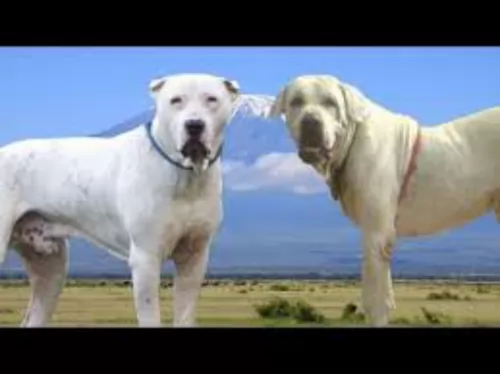 The short coat is low maintenance and as a moderate shedder too, all that is required really is to give your Bully Kutta a good brush twice a week to keep the coat in good condition.
The short coat is low maintenance and as a moderate shedder too, all that is required really is to give your Bully Kutta a good brush twice a week to keep the coat in good condition.
Brush his teeth 2 or 3 times a week with special canine-toothpaste and toothbrush to prevent plaque build-up. He’s a drooler too, so you will need to wipe his face and maybe your clothes of slobber from time to time.
This strong, muscular dog of yours will require an excellent diet. It’s always wonderful if you can give him home-made food such as vegetables, rice and meat. These days you get excellent commercially manufactured food for dogs, and your vet can advise you on the best food for a large, active dog such as the Buly Kutta.
Raw meat is absolutely essential for your dog from time to time and will ensure that his coat doesn’t become dull and with bald spots. Remember, that before dogs were domesticated they used to live on raw meat, so see that he gets some raw meat to prevent skin disorders. Make sure your large pet has a constant supply of fresh, cool water.
Bully Kuttas are going to need a walk every day in the form of exercise. If he is socialized you can take him into the park for ball games. He is a dog that will require plenty of space.
 Feed the puppy 2-3 times a day a total of 2 cups
Feed the puppy 2-3 times a day a total of 2 cups
Feed the adult twice a day a total of 2-3 cups
The Hellenic Hound has excellent stamina, speed and scenting ability.
This is a very active, athletic dog that needs to work and needs exercise. He is powerful, quick and has great endurance. It thrives on hunting but will need other activities on the days it doesn’t hunt. It needs a yard or land to play in. Agility, Field Trials, tracking, hunting and fly ball are all activities the Hellenic Hound will enjoy.